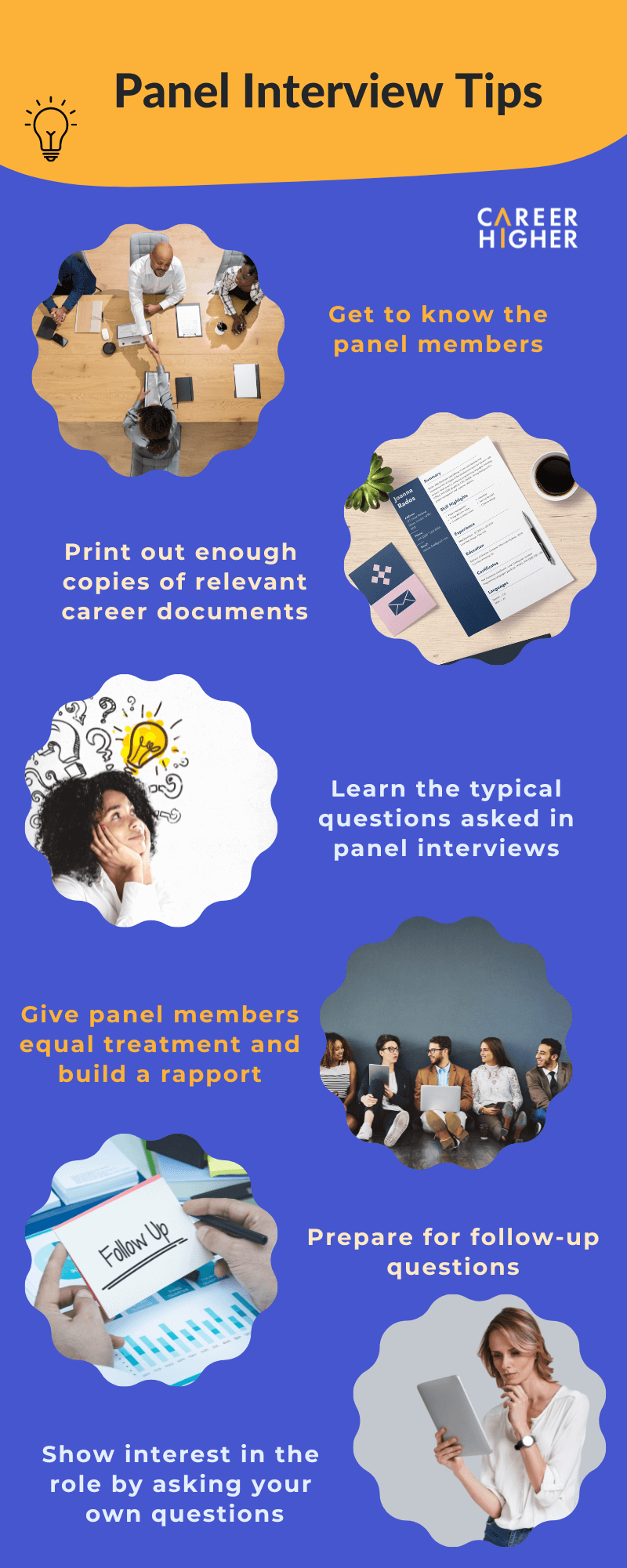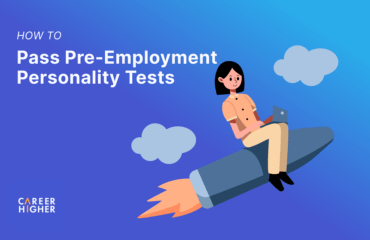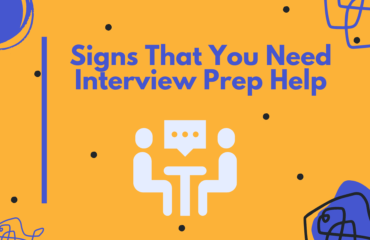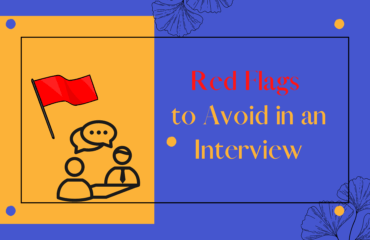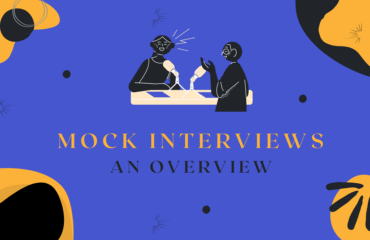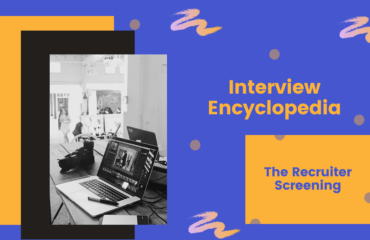Table of Contents
- Why do employers use panel interviews?
- Who is likely to be on the panel?
- What are the panelists looking for?
- What industries use a panel interview?
- What happens during a panel interview?
- How to Respond to a Panel Interview Invitation?
- How To Prepare for A Panel Interview
- Panel Interview Tips
- Panel Interview Questions and Answers
- Conclusion
A panel interview is a type of interview where multiple members of the hiring team evaluate the same candidate simultaneously. Each interviewer has an opportunity to ask different questions based on their individual expertise and background. Depending on the position being recruited, it may be conducted in person or over a conference call. For some candidates, panel interviews can be more stressful than one-on-one interviews as they have to juggle meeting the expectations of many interviewers at once. If you’re one of them, read on as we will share panel interview tips so you can effectively tackle this challenge, perform your best, and impress the panel.
Why do employers use panel interviews?
There are several reasons why employers choose to conduct interviews this way. It allows them to obtain an objective view of a candidate’s strengths and weaknesses from multiple viewpoints. The possibility of bias in the selection process is diminished by encouraging free discussion among panelists as they contrast their perceptions of the interviewee. This provides them with a more comprehensive understanding of each candidate’s suitability for the role, resulting in better hiring decisions.
In a panel interview process, several members of an organization come together to evaluate a candidate all at once. This can save time by eliminating the need to schedule individual meetings with each member of the hiring team. For well-prepared candidates, a panel interview offers a convenient and efficient way to interact with multiple hiring team members and potentially win them over with one stellar performance.
Who is likely to be on the panel?
Many organizations conduct their panel interviews in groups of three or more members. These may include human resources professionals, potential managers, colleagues, and peers. The size of the panel will vary depending on the position and the nature of the hiring process. However, all panelists generally have similar qualifications for the position they are recruiting for. In most cases, a hiring manager or a senior member of the panel will be designated to chair the interview while the others will participate in the discussion.
What are the panelists looking for?
Panelists are typically looking for the same information as traditional interviewers. They are looking to hire someone who possesses the right mix of relevant skills and experience for the job. Apart from this, the interviewers are also interested in determining how well the candidates fit the company culture and values. More specifically, panelists will pay close attention to the candidates’ ability to perform well under pressure, interact with panel members, and establish rapport. This can help determine whether or not the applicant will fit well into their team and add value to the organization once hired.
What industries use a panel interview?
The panel interview is one of the most common types of job interviews, especially for roles where team interaction is key. In fact, research showed that 48% of hiring professionals from various industries use it to screen applicants. However, this type of interview tends to occur more frequently and may even be required as part of the selection process in certain industries. These include academic institutions, large non-profit organizations, financial services, and consulting companies, and government agencies. For applicants in these sectors, preparing for a panel interview is essential to their job search strategy.
What happens during a panel interview?
Panel interviews are often conducted after a candidate has successfully completed a screening interview. Before the actual interview begins, the panelists will usually introduce themselves and give a brief background about their role in the organization. They may also explain the purpose of the interview and provide information about the structure of the panel itself. This helps set the tone for the discussion and prepare the candidates for what lies ahead.
Each panelist will typically have a list of questions they would like to ask each candidate during the interview. Once the discussion gets underway, they will take turns asking questions and discussing the respective responses. You may also be requested to deliver a presentation on a certain topic or perform a task related to the job. At the end of the session, the panel members will then deliberate and reach a decision on whether or not to offer the candidate the position.
How to Respond to a Panel Interview Invitation?
When you are asked to participate in a panel interview, it is best to respond immediately to confirm your availability. A prompt response will show the panelists that you are enthusiastic about the position and motivated to pursue it. On the other hand, a delayed response can be perceived as a lack of interest, which could reflect negatively on you as a candidate.
If you are unable to accept the invitation for some reason, it is in your best interest to let the employer know as soon as possible. You can either send them an email or give them a call to explain the situation and offer an alternative date on which you can be available. This shows that you are proactive and committed to your career objectives.
How To Prepare for A Panel Interview
Succeeding in a panel interview is no different than succeeding in any other job interview. The key to success lies in learning how to prepare for a panel interview. By being well prepared, you will be able to answer questions confidently and demonstrate to the panelists that you are the right person for the job. Apart from studying the role, company, and industry, here are additional useful tips for acing your next panel interview.
1) Get to know your panelists
Like one-on-one interviews, panel interviews provide an opportunity for you to get acquainted and build rapport with your interviewers. This can help you win the trust and confidence of the panelists and may even increase your chances of getting the job offer. For this reason, it is important to take the time to get to know your interviewers in advance and learn as much as you can about them.
Find out the names of the panel members by reviewing the invitation letter or contacting the company. Once you have identified the panelists, familiarize yourself with their background, work experiences, and interests. You can do this by browsing the company website, LinkedIn, social media platforms, or any other public channels where they may have published information about themselves. Doing so will give you a better understanding of your interviewers’ personalities and help you prepare for the interview in a more personal way.
2) Prepare enough copies of relevant career documents for the entire panel
Career documents can include your resume, work samples, and other supporting documents you may need during the selection process. Most interviewers expect candidates to bring copies of these documents with them for the interview. Hence, it is important to ensure that you bring enough materials for the entire panel.
A good rule of thumb is to prepare one to two copies of every document, depending on how many panelists will be reviewing them. It is also a good idea to label the documents with the panel members’ names to ensure that everyone gets their copy. This will help avoid confusion and prevent you from scrambling for a replacement at the last minute.
3) Familiarize yourself with common panel interview questions
You may be wondering what kind of questions are asked in a panel interview. Panel interview questions are not any different from those used in a traditional one-on-one interview. They usually involve assessing your behavior in the workplace and your ability to adapt to the team dynamics. They may also include discussing situations that you encountered in the past and how they prepared you for the position at hand. Familiarizing yourself with the common panel interview questions will leave you feeling better prepared for your interview and give you an opportunity to practice your answers ahead of time.
Panel Interview Tips
In this section, we will talk about best practices for acing the panel interview. Here are a few things you can do to improve your chances of performing well and impressing the panelists.
1) Treat all panelists equally
During a panel interview, it is vital to treat each person equally regardless of their position and level of seniority in the company. Although you may be more comfortable interacting with some panelists more than the others, you should maintain the same level of respect and professionalism with all of them throughout the interview. Treating each panelist with the same courtesy will show that you are a team player who can be relied upon to work well with others.
When you answer the panel questions, try not to differentiate your answers based on who’s asking the question. Instead, give equal consideration to all of your interviewers and address the questions in the same manner. Maintain proper eye contact with each panelist throughout the interview to make them feel involved and show that you are genuinely interested in what they have to say. This will go a long way in helping to establish trust with your interviewers and improve your chances of landing your dream job.
2) Approach the panel interview like a conversation
Some candidates tend to view a panel interview as a standard question and answer session. However, this is actually a conversation between you and the interviewers rather than a one-sided exchange of information. It is therefore important to take the time to connect with them and create an atmosphere that fosters open communication between you and the panelists. By keeping the interview conversational, you’ll be able to engage in a meaningful exchange of ideas that will allow you to gain an advantage over other candidates.
As you converse with the panelists, pay attention to their body language and level of formality to get an idea of how casual your conversation can be. Listen to what they have to say and look for opportunities to respond to their comments in a meaningful way. Use common grounds, like shared interests and experiences, to create a positive connection and show your compatibility with the company and the position. In turn, your responses will appear more conversational and relevant to the discussion without being too long-winded or inappropriate.
3) Expect follow-up questions
With multiple decision-makers involved in the interview process, you will likely be asked several follow-up questions after you’ve answered the initial one. Typically, these questions are open-ended and designed to dig deeper into your knowledge and determine your ability to respond appropriately under pressure. Hence, it is imperative to provide thoughtful responses that show you have a clear grasp of the issues and are able to provide specific examples to support your claims.
Prepare several examples of relevant experiences and achievements that you can draw from when responding to follow-up questions. During the panel interview, make sure to listen carefully to each question and address each comment. Ask the panel if further clarification is needed before moving on to the next panel interview question. By taking this approach, you will be able to provide a clear response that hits the mark and provides a strong basis for landing the job offer.
4) Ask smart questions to the panel
The panel interview is a two-way street. It’s not only a chance for the interviewers to get to know you but also an opportunity to learn more about the company and the role. As such, it is essential to ask relevant questions to the panel during the interview. This will allow you to showcase your enthusiasm and interest in the role, making a compelling case for your candidacy. Apart from this, the panel’s multiple viewpoints can also provide valuable insights that will help you make an informed decision on whether the position is the right fit for you. Let’s take a look at some of the example questions you can ask.
- What do you find most enjoyable about working for this company?
- How does this position fit with the company’s overall objectives?
- What would a typical day in this position look like?
- What best describes the culture of your company?
- How did past employees succeed in this role?
- What do you believe to be the most difficult aspect of working for this company?
Panel Interview Questions and Answers
Now that you know how to prepare and succeed in a panel interview, let’s get into the nitty-gritty and discuss some of the common questions you are likely to encounter. We’ve also listed a few sample answers that can serve as your inspiration. We recommend adapting these answers to your own experience and to the specific job you’re applying for.
Question 1: Tell us a little bit about yourself
This may be one of the easiest questions to answer as it’s essentially an open-ended prompt for you to share your experiences, accomplishments, and goals. However, avoid focusing too much on personal matters. Instead, highlight key qualities that make you a good fit for the position and demonstrate the value that you will bring to the organization. Keep your answer concise but engaging enough to pique the panel’s interest.
Answer Example: “My name is Jane Doe and I’m an experienced Project Manager with a master’s degree in Business Administration from a leading university. I have over eight years of experience working in the financial services industry, during which I have successfully managed a number of high-profile projects and led a team of high-performing individuals. My greatest strength lies in my ability to build strong interpersonal relationships with my clients and colleagues, enabling me to resolve any issues that arise during the course of the project. I thrive under pressure and am able to complete projects within strict deadlines without compromising on quality. Working for this company is an exciting opportunity to utilize my project management expertise and contribute to its long-term growth.”
Question 2: Have you ever had a disagreement with a superior or coworker? How did you manage it?
This question is intended to assess your problem-solving and conflict-resolution skills. In your response, make sure to discuss how you approached the conflict and how you managed to resolve it. Focus on the role you played rather than placing the blame on others.
Answer Example: “I once had a disagreement with one of my teammates regarding the scope of the project that we were working on. At the time, we were facing a tight deadline and there were several other critical tasks that required my attention. Instead of arguing it out with my colleague, I decided to approach our manager and asked for guidance. After the discussion, we agreed on a course of action and worked together to successfully complete the task within the deadline.”
Question 3: Tell us why you want to work with us.
Employers use this question to gain insight into your motivation for applying. A strong response will demonstrate your enthusiasm and understanding of the company’s mission and culture. In addition, make sure to articulate the value that you will bring to the team.
Answer Example: “I’m excited to work for the company because of its reputation for providing high-quality consulting services to its clients and excellent career opportunities for its employees. Apart from this, working with clients to find creative solutions to their financial problems has always been my passion. This role provides me with an opportunity to achieve my career objectives while making a difference in clients’ lives.”
Question 4: How would a coworker describe you?
The panelists ask this question to gather feedback from people you work with and gauge their view of you as an employee. Prepare your answer by reflecting on the traits that your coworkers typically associate with you. Think about the feedback you received in the past and incorporate it into your response.
Answer Example: “A teammate would describe me as a good listener who is always willing to help them out when they are struggling with an assignment. If I notice that someone is having trouble performing a particular task, I will check in with them and offer to provide assistance if needed. This has helped foster a positive work environment in our department as coworkers feel supported and encouraged to perform at their best.”
Question 5: Have you got any questions for us?
In most cases, panel interviews end with this question. This is your chance to demonstrate your interest in the role by having insightful questions for the panelists. Focus on questions that show you have taken the initiative to research the organization and clearly understand the position requirements.
Answer Example: “I am particularly interested in getting a sense of the team’s day-to-day responsibilities and workflow. What are their challenges? I am also interested in learning how the performance is monitored and evaluated so I can understand how this role fits into the organization’s overall goals.”
Additional list of common panel interview questions
Below is an additional list of common questions you may face in a panel interview. We highly recommend preparing answers to each of these questions in advance. Doing so will set you up for success and help you make a great impression.
- Describe a challenging situation you had to face at work and how you handled it.
- Tell us a situation where you had to make a major decision without any guidance or help. What did you do?
- Why did you leave your previous position?
- What is your preferred work environment?
- Tell us about your background in [technical skill].
- What was the biggest mistake you made in your previous role? How did you correct it?
- Can you give us an example of a time when you had to explain a complex issue to someone who was not familiar with the subject?
- Tell us about a time when you had to handle a challenging client. How did you prevent the situation from getting worse?
- Imagine that you are introducing a new policy to your coworkers while encountering resistance. What approach would you take?
Conclusion
Panel interviews can be intimidating. However, with adequate preparation and a confident attitude, you can sail through the interview process and give yourself the best chance of landing your dream job. If you need additional assistance preparing for your next panel interview, please don’t hesitate to reach out to us.

